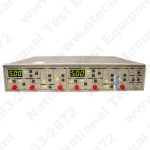Contact us for pricing and availability.
Description
Each filter channel has a floating, differential input with 1 MW input impedance and 6 nV/ÖHz of input noise. The analog ground for each filter channel is available at a rear-panel BNC connector to provide complete flexibility in grounding. The filter grounds may be tied to the instrument's chassis ground or to any other point. Both AC and DC input coupling can be selected, and an invert key allows the phase of the signal to be shifted by 180° with a single key press. Up to 60 dB of preamplifier gain can be specified in 10 dB increments. A simple offset adjust screw lets you null DC components in your signal.
Filter Characteristics
Filter characteristics for the SR600 series are shown below. The exact filter transfer function is given in the specifications section. (The graph shows the low pass response. The high pass response is found by inverting the curve around f=1.) The large amount of excess phase, typical of elliptical filters, makes the SR600 series filters optimum in frequency-domain applications. Note that the 0.1 dB passband ripple specification for the SR640 series filters is a measured specification, not just the theoretical passband ripple of the transfer function. Other filter characteristics include an attenuation slope of -115 dB/octave and a stopband attenuation of greater than 80 dB. Worst-case phase match between channels is better than ±0.75° from DC to 100 kHz, and improves to ±0.25° for cutoff frequencies below 10 kHz.
SR640 Gain Response
Post-Filter Gain and Bypassing
After the filter, another amplifier section provides up to 20 dB additional gain. The standard output drives loads of greater than 300 W at 10 Vpp, while the optional high-power output drives 10 Vpp into a 50 W load. Each filter may be independently bypassed from the front panel or from the computer interface. When bypassed, both the prefilter and postfilter gains remain active, and the resulting amplifier has a bandwidth of 450 kHz.
Filter Characteristics
Filter characteristics for the SR600 series are shown below. The exact filter transfer function is given in the specifications section. (The graph shows the low pass response. The high pass response is found by inverting the curve around f=1.) The large amount of excess phase, typical of elliptical filters, makes the SR600 series filters optimum in frequency-domain applications. Note that the 0.1 dB passband ripple specification for the SR640 series filters is a measured specification, not just the theoretical passband ripple of the transfer function. Other filter characteristics include an attenuation slope of -115 dB/octave and a stopband attenuation of greater than 80 dB. Worst-case phase match between channels is better than ±0.75° from DC to 100 kHz, and improves to ±0.25° for cutoff frequencies below 10 kHz.
SR640 Gain Response
Post-Filter Gain and Bypassing
After the filter, another amplifier section provides up to 20 dB additional gain. The standard output drives loads of greater than 300 W at 10 Vpp, while the optional high-power output drives 10 Vpp into a 50 W load. Each filter may be independently bypassed from the front panel or from the computer interface. When bypassed, both the prefilter and postfilter gains remain active, and the resulting amplifier has a bandwidth of 450 kHz.
